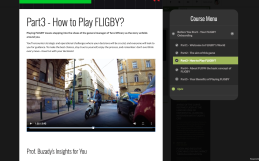From Grapes to Growth
Does the Winery Theme Cultivate Leadership Learning?
FLIGBY is recognized not only as the official Flow program—developed with the active involvement of Prof. Mihaly Csikszentmihalyi in its design process—but also as the ultimate “winery simulation,” since it takes place in a dynamic, family-owned business in California’s Napa Valley. Considering FLIGBY’s commercial success and numerous awards, the vineyard theme appears to be an excellent choice for raising people’s interest in solving complex leadership puzzles and dilemmas.
However, there is a recurring concern about how far an engaging story set in a winery can serve as a model for organizations competing in highly volatile business landscapes, such as banking, pharmaceuticals, or IT services. In the following sections, we will address these typical concerns and examine their validity.
Concerns Expressed by Potential Corporate Clients
- “The simulation’s story doesn’t take place in an organization similar to ours.” – Potential clients occasionally worry that because the FLIGBY simulation is set in a winery, it may not reflect the specific realities or nuances of their own industry or company type. They may fear that their employees will struggle to relate to the characters, challenges, or scenarios presented. This concern can stem from a belief that leadership and management issues are highly context-dependent and that learning is most effective when it mirrors their daily work environment. Clients sometimes expect an immediate, one-to-one parallel between the simulation and their business processes, corporate structure, or market. As a result, they may question whether the lessons learned will be meaningful and transferable to their actual workplace.
- “Our employees don’t necessarily understand the wine business.” – Another common concern is that participants may lack even a basic knowledge of how a winery operates, which could lead to confusion or disengagement. Corporate clients might worry that unfamiliar terminology or industry-specific scenarios will distract from the core learning objectives. They may fear that employees will focus on trying to understand the wine business instead of concentrating on developing their leadership skills. This concern is especially relevant for organizations in sectors far removed from food, agriculture, or the hospitality industry. Ultimately, clients want reassurance that the simulation’s context won’t become a barrier to effective learning.
- “Will the simulation’s challenges and solutions be relevant to our leadership needs?” – Clients sometimes question whether the dilemmas, conflicts, and decision points in FLIGBY reflect the kinds of leadership situations their managers truly face. They may be concerned that the problems in the simulation could be too generic, too industry-specific, or not complex enough to match their real-world demands. There’s also apprehension about whether the feedback and solutions provided by the simulation are tailored to support specific leadership competencies required in their organization. This concern often arises from a desire for highly customized learning experiences that target unique business strategies or cultural values. Ultimately, clients want to ensure that participating in FLIGBY will provide their teams with practical, actionable takeaways.
Let’s address these concerns by exploring why the winery context is not only appropriate but also highly effective for leadership development.
The Most Important Rule in Simulating Complex Dilemmas
The first rule of designing effective simulations for complex people dynamics is to intentionally create a context that differs from the user’s everyday reality. When participants are immersed in a setting that is not directly aligned with their usual work environment, they are more open to exploring new perspectives and solutions. This distance from familiar routines reduces the risk that preconceived notions and workplace biases will influence decision-making within the simulation. As a result, individuals are more likely to engage with the scenarios on their own terms, focusing on the underlying principles rather than on specifics that might trigger resistance or defensiveness. In unfamiliar contexts, participants tend to experiment more freely and reflect more deeply on the outcomes of their choices.
Moreover, lessons learned in a novel environment often become more memorable and impactful because the experience stands apart from daily routines. This separation helps users internalize and apply insights about leadership, teamwork, and problem-solving to their actual roles. By removing the distractions of industry-specific terminology and processes, the simulation highlights universal human behaviors and leadership challenges that transcend specific industries. Ultimately, the power of a simulation lies not in how closely it mimics the user’s workplace, but in how effectively it creates space for open-minded learning and self-discovery. This is why FLIGBY’s winery setting is such a powerful vehicle for leadership development.
Of course, the absolute opposite is true when the task is to teach highly routine or technical skills, such as using specialized software or flying an airplane (excluding managing people dynamics during the flight). In such cases, simulations must be precise and accurately model reality to ensure mastery of skills and safety. This emphasis on precision and realism instills a sense of security and confidence in the audience. Precision and realism are crucial when the goal is to replicate exact procedures and responses rather than explore broader behavioral or leadership principles.
Why the Winery Story Works
And now, let’s return to the common concerns we listed at the beginning of this entry.
- “The simulation’s story doesn’t take place in an organization similar to ours.” Our experience over the past decade shows otherwise – FLIGBY’s winery setting is deliberately different from most participants’ everyday workplaces, which is actually a key advantage. Leadership challenges, such as managing teams, resolving conflicts, and making strategic decisions, are universal and not limited to any one industry. The winery acts as a rich metaphor for any organization, with elements such as nurturing a vineyard or blending wines paralleling team development and strategic alignment. This abstract setting enables participants to focus on fundamental leadership principles without being distracted by industry-specific details or jargon. As a result, the lessons learned are broadly applicable and can be effectively transferred to any business environment.
- “Our employees don’t necessarily understand the wine business.” Our experience over the past decade shows otherwise –FLIGBY is designed so that no prior knowledge of winemaking is required. The simulation provides all the necessary context, allowing participants to concentrate fully on leadership skills rather than technical details. This ensures that everyone starts on equal footing and can engage deeply without confusion or distraction. By removing industry-specific barriers, the simulation emphasizes universal competencies like emotional intelligence, communication, and problem-solving. This approach keeps the learning focused and accessible, regardless of participants’ backgrounds.
- “Will the simulation’s challenges and solutions be relevant to our leadership needs?” Our experience over the past decade shows otherwise – The dilemmas and decision points in FLIGBY reflect real-world leadership challenges faced across industries, making the experience highly relevant. Research shows that simulations set in non-traditional contexts can foster open-mindedness and creativity, encouraging participants to explore new ways of thinking. The feedback and learning outcomes target essential leadership skills, including conflict management, strategic thinking, and team engagement. Because the setting is neutral, learners are less likely to be influenced by workplace habits or biases, which helps deepen their understanding. Ultimately, FLIGBY provides practical insights and actionable lessons that resonate with leaders across all sectors.





